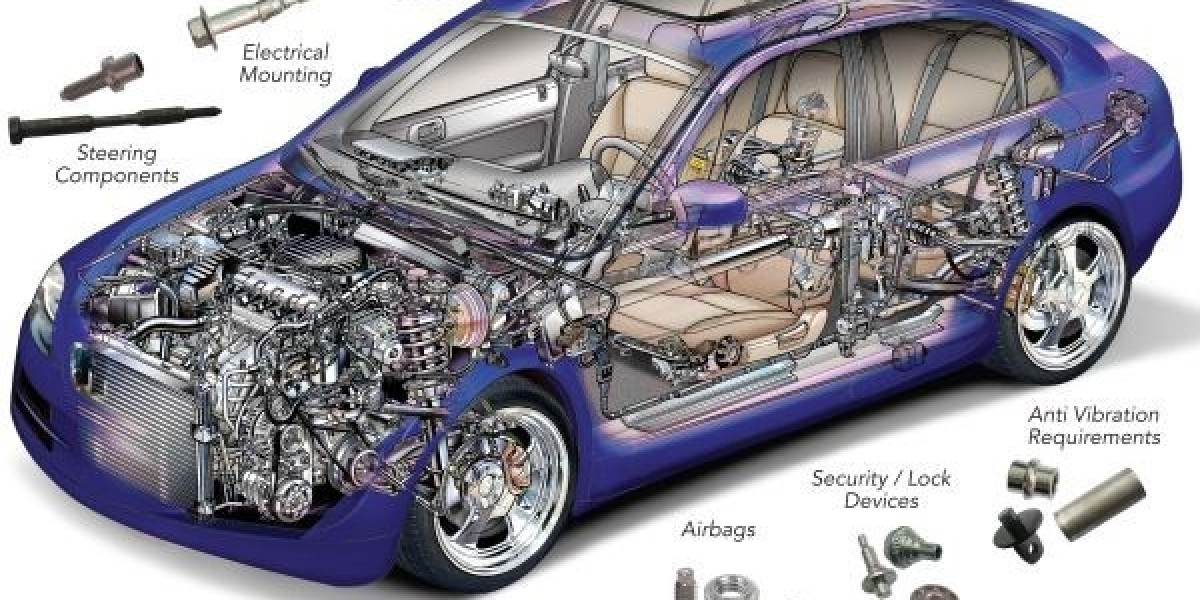Automotive Fasteners: A Comprehensive Market Research Report
Introduction
In the ever-evolving automotive industry, fasteners play a crucial role in ensuring the safety, integrity, and efficiency of vehicles. From threaded to non-threaded fasteners, they are the unsung heroes that hold everything together. This comprehensive market research report aims to provide valuable insights into the Automotive Fasteners Market, covering various aspects such as types, applications, sales channels, propulsion, end-use, and regional forecasts until 2030.
Types of Fasteners
Threaded Fasteners
Threaded fasteners form an integral part of automotive assembly, securing components by engaging with internal or external threads. They are commonly used in applications requiring high-strength connections, such as engine components, chassis, and body panels. Threaded fasteners include bolts, screws, studs, and nuts, each designed to withstand specific loads and provide optimal performance.
Non-threaded Fasteners
Non-threaded fasteners, also known as rivets and clips, offer unique advantages in automotive manufacturing. These fasteners provide fast and secure solutions for joining materials like plastic, aluminum, and steel. Non-threaded fasteners are widely used in bodywork assembly, interior components, and electrical systems, ensuring durability and structural integrity.
Applications and Materials
plastic clips for cars cater to a wide range of applications and materials, adapting to the diverse needs of the industry.
Steel
Steel fasteners, known for their exceptional strength and reliability, find extensive use in critical automotive components. Their robustness and resistance to high temperatures and vibrations make them ideal for engine systems, suspension, and drivetrain applications.
Aluminum
As the automotive industry continues to prioritize lightweight solutions, aluminum fasteners have gained significant traction. They offer a perfect balance between strength and weight reduction, making them suitable for lightweight body panels, trim, and interior applications.
Brass, Nickel, and Copper
Brass, nickel, and copper fasteners offer superior corrosion resistance properties, making them well-suited for applications exposed to harsh environmental conditions. These materials find application in electrical systems, connectors, and other critical components requiring optimal conductivity and durability.
Plastic
The use of plastic fasteners has grown exponentially in recent years due to their lightweight nature, corrosion resistance, and ease of manufacturing. Plastic fasteners are widely employed in interior trim, dashboard components, and non-load-bearing applications.
Sales Channels
The automotive fasteners market comprises two primary sales channels:
OEM (Original Equipment Manufacturer)
OEM sales channels cater to the demand for fasteners from vehicle manufacturers. These fasteners are specifically designed and manufactured to meet the unique requirements of each automaker, ensuring seamless integration into their production processes.
Aftermarket
The aftermarket segment provides fasteners for repairs, maintenance, and replacement purposes. With a focus on compatibility and quality, aftermarket fasteners offer an essential solution for consumers, service centers, and independent repair facilities.
Propulsion
As the automotive industry undergoes a significant transformation, propulsion systems play a pivotal role in shaping the market dynamics for fasteners.
Internal Combustion Engine (ICE)
ICE-powered vehicles continue to dominate the global automotive market. Fasteners designed for ICE applications must withstand high temperatures, mechanical stress, and vibrations, ensuring the longevity and reliability of critical components.
Electric Vehicles (EV)
The rise of electric vehicles presents new challenges and opportunities for automotive fasteners. EV fasteners must accommodate lightweight materials, support electrical systems, and contribute to the overall efficiency of the vehicle. With advancements in EV technology, fasteners play a vital role in ensuring the structural integrity and safety of electric vehicles.
End Use
Fasteners are classified based on their intended use, providing tailored solutions for different automotive assembly requirements.
Removable Fasteners
Removable fasteners offer flexibility and ease of disassembly, enabling convenient access for repairs and maintenance. These fasteners find application in components that require periodic inspection, such as interior trims, engine covers, and electrical connectors.
Semi-Permanent Fasteners
Semi-permanent fasteners strike a balance between removable and permanent solutions. They provide the necessary strength and security while allowing for disassembly when required. Semi-permanent fasteners are commonly used in body panels, structural components, and sub-assemblies.
Permanent Fasteners
Permanent fasteners are designed for long-term use and typically require specialized tools or techniques for removal. They provide exceptional strength and ensure the integrity of critical assemblies, such as engine blocks, chassis connections, and safety systems.
Regional Analysis and Forecast
The Car Fasteners Market exhibits significant regional variations, driven by factors such as automotive production, technological advancements, and economic conditions. The following regions are expected to play a crucial role in shaping the market:
- North America
- Europe
- Asia-Pacific
- Latin America
- Middle East & Africa
Each region possesses unique characteristics, market dynamics, and regulatory frameworks that impact the demand and supply of automotive fasteners. This comprehensive market research report provides in-depth analysis and forecasts for each region, empowering industry stakeholders to make informed decisions.
Conclusion
The Automotive Fasteners Market continues to evolve with the advancement of automotive technology, safety regulations, and consumer demands. This research report serves as a comprehensive guide, offering valuable insights into the market's various segments and regional dynamics. By understanding the intricacies of automotive fasteners, manufacturers, suppliers, and industry professionals can navigate the market landscape more effectively and ensure the development of safe, reliable, and efficient vehicles.
Related Report:
Electronics Sensor AfterMarket
aluminium in automotive industry








